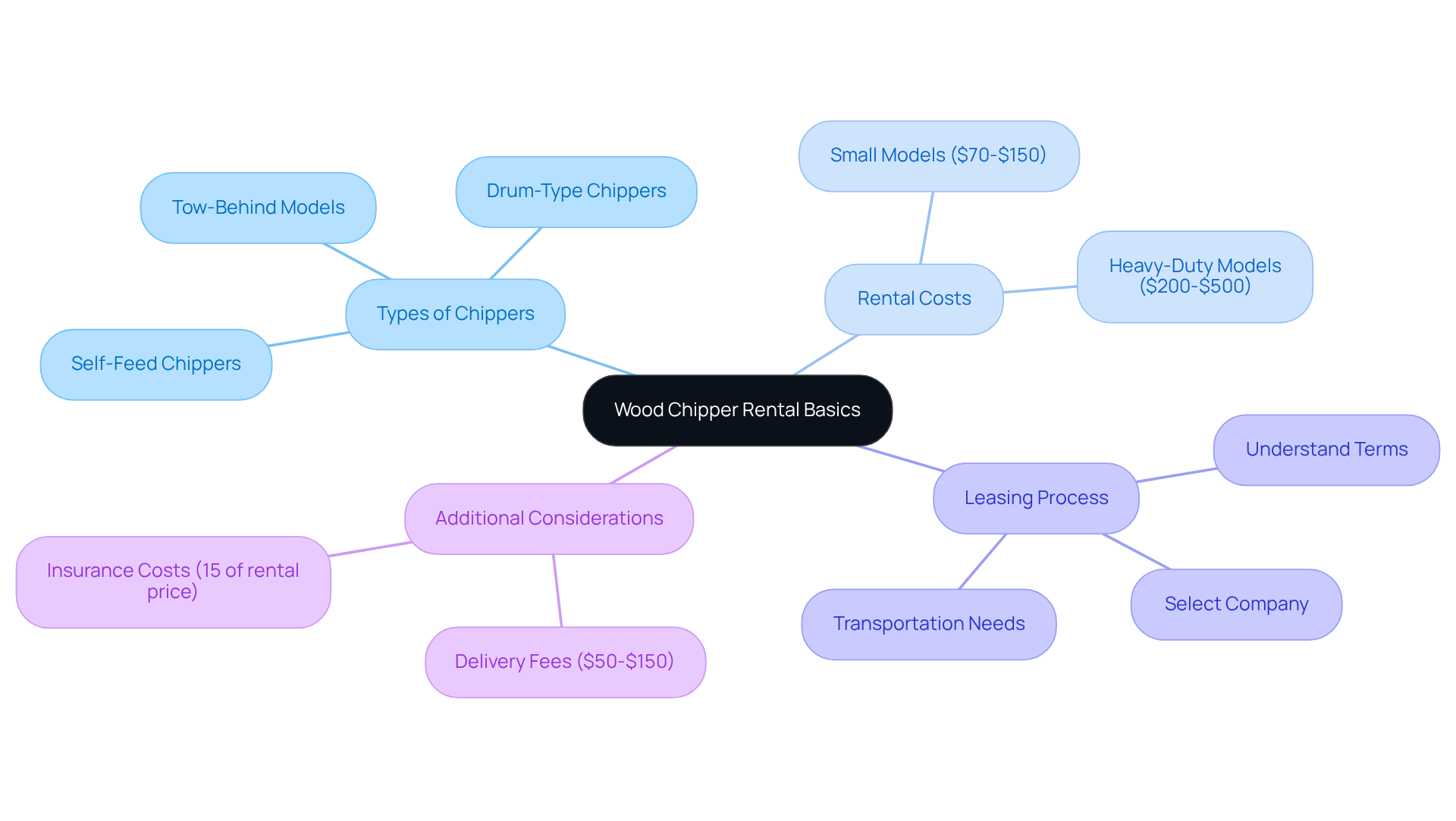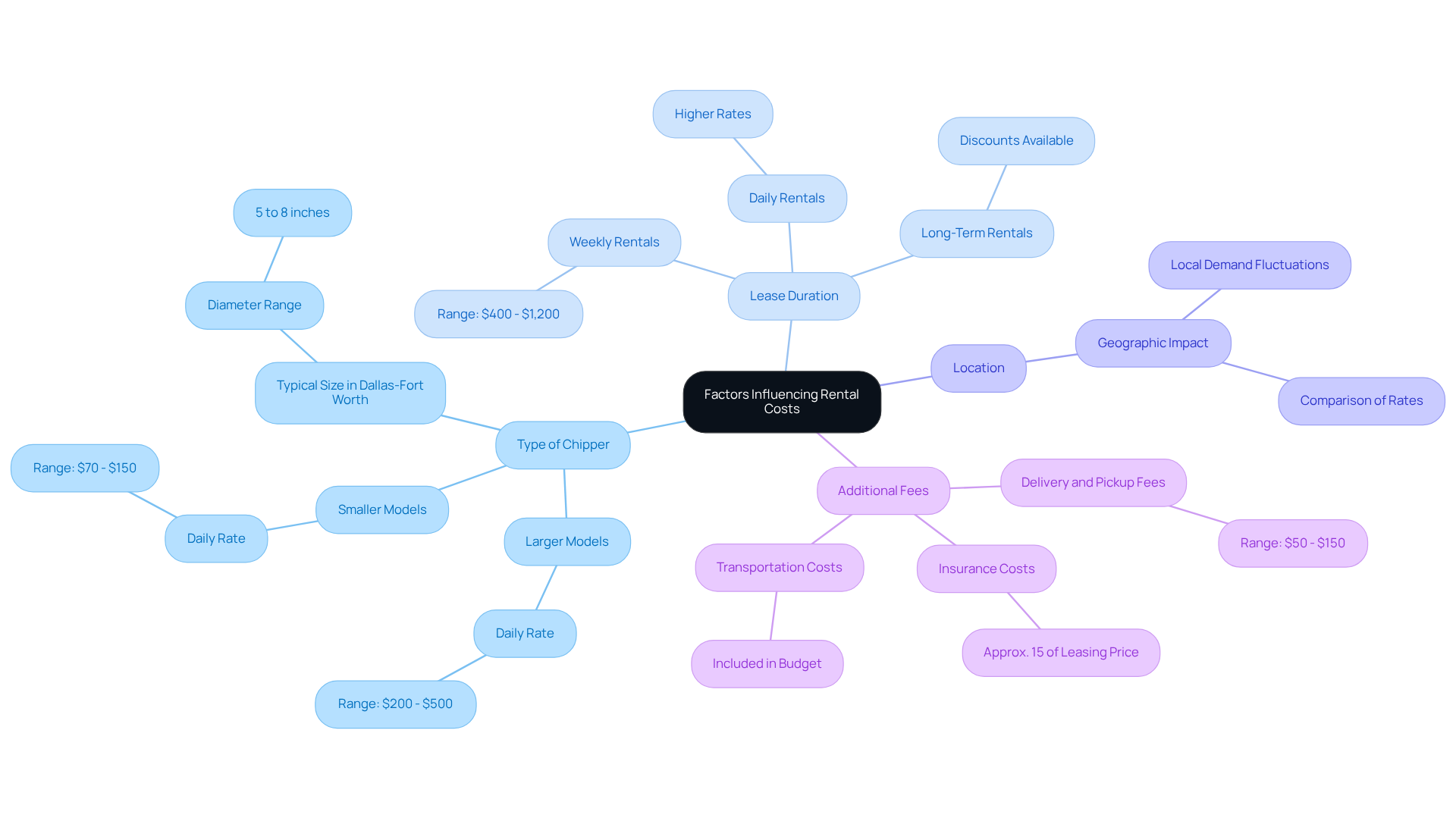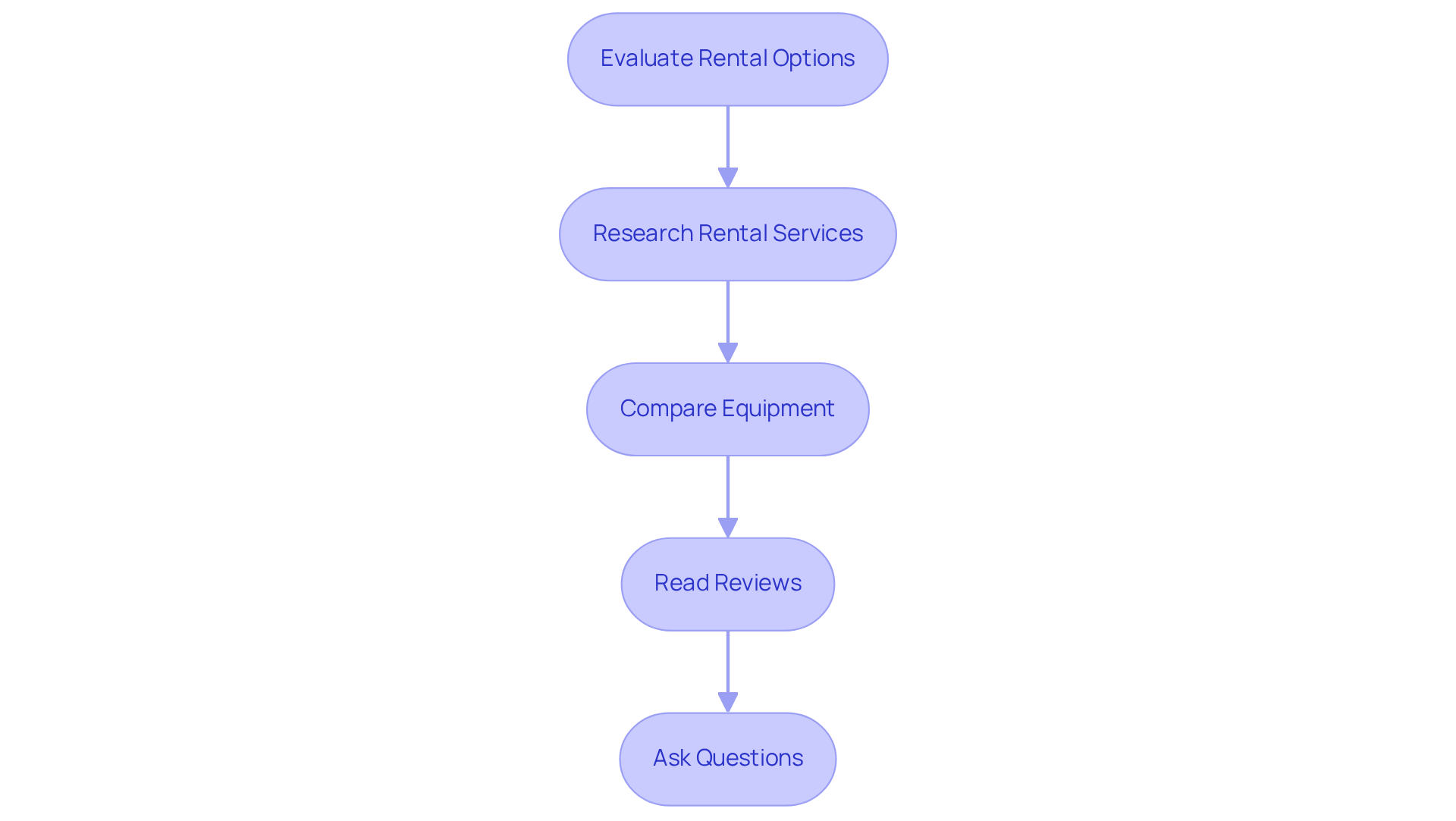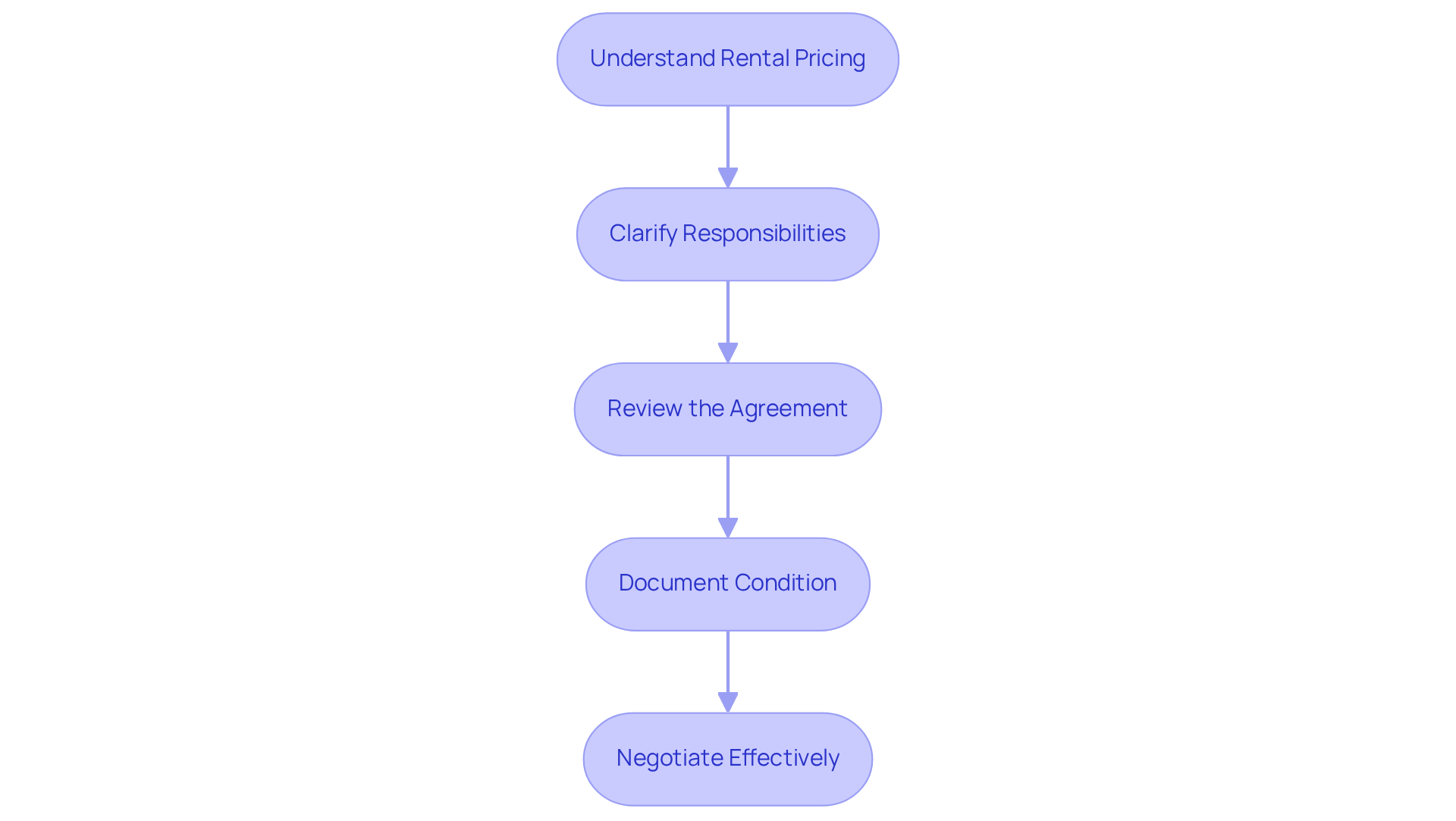Overview
Renting a wood chipper can cost between $70 and $550 per day, with prices influenced by various factors. These include:
- The type of chipper
- The duration of the lease
- The rental location
- Additional fees such as delivery and insurance
Smaller models tend to be more affordable, while larger, heavy-duty options command higher prices. Understanding these variables is crucial for effectively managing rental expenses. By being informed, customers can make better decisions that align with their budget and project needs.
Key Highlights:
- Wood chippers reduce timber and yard waste into smaller pieces for easier disposal or use as mulch.
- Rental costs range from $70 to $550 per day, depending on the chipper type and size.
- Smaller electric/gas models typically cost $70 to $150 per day; larger, heavy-duty models range from $200 to $500.
- Key factors influencing rental costs include chipper type, lease duration, location, and additional fees.
- Delivery fees usually range from $50 to $150, and insurance costs are around 15% of the rental price.
- Researching rental services, comparing equipment, reading reviews, and asking questions are crucial steps in evaluating options.
- Negotiating rental terms can lead to discounts, especially for longer rental periods.
- Understanding responsibilities, reviewing agreements, and documenting equipment condition are essential for a smooth rental experience.
- Rental pricing can fluctuate seasonally, with higher prices during peak demand periods.
Introduction
Understanding the costs associated with renting a wood chipper is crucial for optimizing project efficiency and managing your budget effectively. Homeowners and landscapers face a wide range of rental prices, from $70 to over $500 per day, which can be overwhelming. What drives these varying costs? By navigating the rental process thoughtfully, you can secure the best value.
Exploring the specifics of wood chipper rentals not only uncovers the complexities of pricing but also highlights strategic choices that can lead to significant savings and optimal results in your landscaping projects.
Understand Wood Chipper Rental Basics
A chipper is a powerful device designed to minimize timber and yard waste into smaller pieces, making disposal or use as mulch easier. When renting a chipper, it is crucial to understand the various types available, including tow-behind models and self-feed chippers, along with their specific capabilities. In 2025, the cost to rent a wood chipper typically ranges from $70 to $550 per day. When considering how much it is to rent a wood chipper, smaller electric or gas models generally cost $70 to $150 per day, while larger, heavy-duty chippers can range from $200 to $500 per day.
The leasing process involves:
- Selecting a reputable leasing company
- Understanding the specific leasing terms
- Ensuring you have the necessary transportation to collect the equipment
Delivery fees, ranging from $50 to $150, may vary based on distance and duration of use. It is advisable to inquire about insurance costs, typically around 15% of the leasing price, to protect against potential mishaps.
Familiarizing yourself with these fundamentals will enable you to navigate the rental landscape more effectively. For instance, understanding the features of various chippers can aid in selecting the right equipment for your project needs. Drum-type chippers, which are increasingly popular due to their capacity to process a variety of materials, are projected to capture a significant market share in 2023. By evaluating your material processing requirements and budget, you can make informed decisions that enhance efficiency and cost-effectiveness in your landscaping or tree care projects.

Identify Key Factors Influencing Rental Costs
Several key factors significantly influence how much is a wood chipper to rent.
-
Type of Chipper: Rental rates for wood chippers vary considerably based on their type and capabilities. Larger, heavy-duty models can range from $200 to $500 daily, while smaller electric or gas models generally cost between $70 and $150 each day. In the Dallas-Fort Worth region, the typical size of tree chippers rented generally falls between 5 to 8 inches in diameter, catering to both residential and commercial needs.
-
Lease Duration: The length of the lease period plays a crucial role in determining the overall cost. Daily rates frequently exceed those of weekly or monthly rentals, with weekly charges generally ranging from $400 to $1,200. Short-term leases may incur higher daily rates compared to extended contracts, making it advantageous to plan for longer durations whenever possible.
-
Location: Geographic location can significantly impact leasing prices. The availability of tools and local demand can lead to fluctuations in pricing, so it's essential to compare rates from various providers in your area.
-
Additional Fees: Be mindful of possible extra charges that can influence your total expense. Delivery and pickup fees typically range from $50 to $150, and insurance options can add approximately 15% to the leasing price. Additionally, transportation costs for the equipment should be included in your budget.
Understanding these factors will assist you in budgeting more accurately for how much it is to rent a wood chipper, ensuring that you can effectively manage expenses while fulfilling your project requirements.

Evaluate Rental Options and Make Informed Choices
When evaluating rental options for wood chippers, it is crucial to follow these essential steps to ensure an informed choice:
-
Research Rental Services: Identify reputable leasing companies in your area, such as EZ Equipment Leasing, recognized for its commitment to quality and dependability in tools leasing. This foundational step sets the stage for a reliable rental experience.
-
Compare Equipment: Examine the specifications of various wood chippers, focusing on power, capacity, and features. Ensure that the selected chipper aligns with your project requirements, as different models cater to varying needs. This careful comparison will help you identify the best fit for your specific tasks.
-
Read Reviews: Investigate customer feedback and ratings to evaluate the reliability of the leasing firm and the condition of their equipment. High ratings often indicate a history of customer satisfaction and well-maintained tools, reinforcing your confidence in your choice.
-
Ask Questions: Engage with leasing companies to inquire about their policies, maintenance practices, and any specific concerns you may have. This proactive approach will enhance your confidence in the leasing process and assist you in selecting the best option for your project.
By following these steps, you can effectively compare chipper options and find out how much is a wood chipper to rent, allowing you to choose the right equipment for your needs. Take action now to secure the best tools for your projects!

Negotiate Rental Terms and Understand Agreements
Before finalizing your rental agreement, it is essential to understand how much is a wood chipper to rent and negotiate the terms. Discuss pricing by asking how much is a wood chipper to rent, and inquire about available discounts for longer rental periods or package deals. Numerous leasing companies provide incentives that can significantly reduce expenses, particularly regarding how much is a wood chipper to rent for long-term agreements. The apparatus leasing sector is anticipated to increase by $48.6 billion from 2022 to 2029, making it vital to negotiate effectively in this flourishing market.
-
Clarify Responsibilities: Ensure you understand your obligations regarding maintenance of tools, fuel usage, and liability for any damages. Clear communication about these responsibilities can prevent misunderstandings later.
-
Review the Agreement: Carefully read through the lease agreement to confirm that all terms are clear, including payment schedules, cancellation policies, and insurance coverage. If any aspect is unclear, seek clarification before signing to avoid unexpected charges. As highlighted in the case study "Review the Rental Contract," understanding all aspects of the contract is vital to prevent disputes.
-
Document Condition: Prior to taking possession of the chipper, document its condition with photos. This proactive measure can help you avoid disputes regarding damages upon return, protecting you from potential additional fees. In the words of an experienced negotiator, "Ultimately, your ability to negotiate lower equipment leasing costs hinges on precise strategies, impeccable timing, and leveraging every available resource to its fullest." Comprehending these factors is essential for a seamless leasing experience and can result in improved negotiation outcomes, guaranteeing you receive the best value for your project. Additionally, be aware that how much is a wood chipper to rent can fluctuate, as rental pricing is sensitive to seasonal trends, with higher prices typically seen during peak demand periods.

Conclusion
Renting a wood chipper can be a straightforward process when equipped with the right knowledge about costs and considerations. Understanding the various factors that influence rental prices—such as the type of chipper, lease duration, geographic location, and potential additional fees—is crucial. By being informed about these elements, individuals can make better decisions that align with their project needs and budget constraints.
Significant price variations exist based on chipper types; smaller models are generally more affordable than larger, heavy-duty options. Additionally, the length of the rental period can lead to cost savings, as longer leases typically offer better rates. Thorough research, comparing rental services, and negotiating terms are necessary steps to secure the best deal possible. Such proactive measures can lead to a smoother rental experience, ultimately enhancing the efficiency of landscaping or tree care projects.
In conclusion, grasping the nuances of wood chipper rentals aids in budgeting and empowers individuals to select the right equipment for their specific needs. By investing time in research and effective negotiation, renters can ensure they receive the best value for their investment. As the demand for rental equipment continues to rise, staying informed about rental processes and cost factors will be essential for anyone looking to successfully tackle outdoor projects.
Frequently Asked Questions
What is a wood chipper used for?
A wood chipper is a powerful device designed to minimize timber and yard waste into smaller pieces, making disposal or use as mulch easier.
What types of wood chippers are available for rent?
Available types of wood chippers include tow-behind models and self-feed chippers, each with specific capabilities.
How much does it typically cost to rent a wood chipper in 2025?
In 2025, the cost to rent a wood chipper typically ranges from $70 to $550 per day, with smaller electric or gas models costing $70 to $150 per day and larger, heavy-duty chippers ranging from $200 to $500 per day.
What should I consider when renting a wood chipper?
When renting a wood chipper, consider selecting a reputable leasing company, understanding the specific leasing terms, and ensuring you have the necessary transportation to collect the equipment.
Are there additional costs associated with renting a wood chipper?
Yes, there may be delivery fees ranging from $50 to $150 based on distance and duration of use. Additionally, insurance costs, typically around 15% of the leasing price, should be inquired about to protect against potential mishaps.
What features should I look for in a wood chipper?
Familiarizing yourself with the features of various chippers, such as drum-type chippers, which can process a variety of materials, can help in selecting the right equipment for your project needs.
How can I make informed decisions about renting a wood chipper?
By evaluating your material processing requirements and budget, you can make informed decisions that enhance efficiency and cost-effectiveness in your landscaping or tree care projects.




